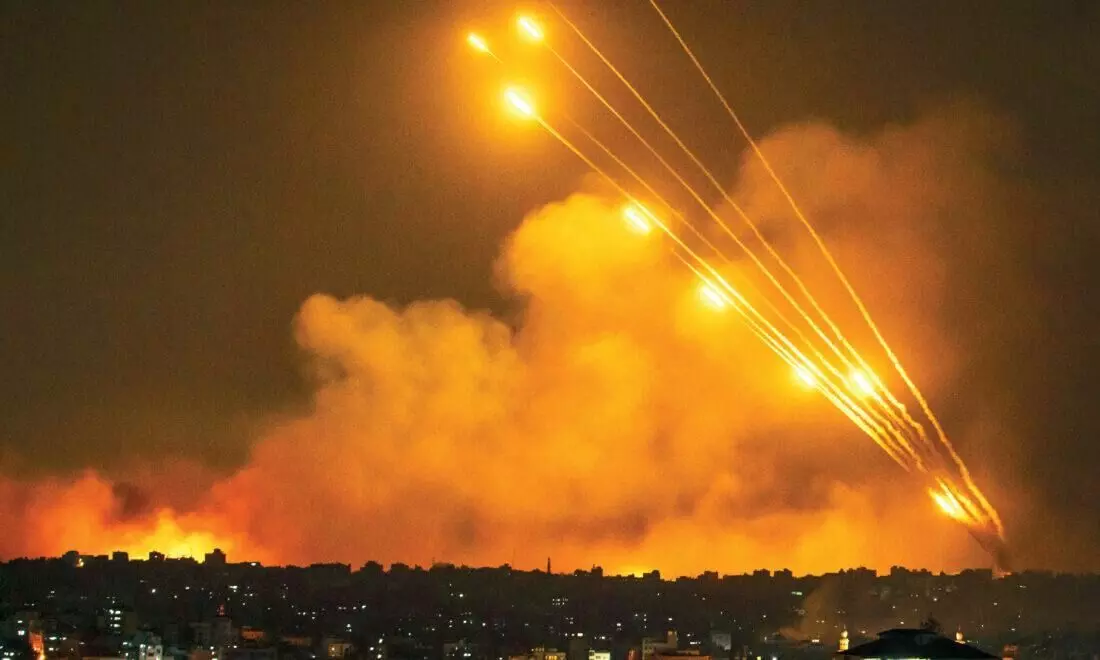
Israel-Lebanon conflict raises concerns
text_fieldsRepresentational.
While ongoing US-led efforts to broker a cease-fire in Gaza remain in uncertainties, there have been early signs of Israel's sinister desire to escalate the war. The realization that if there are more conflicts in the region, it will affect not only Israel but also the powers backing the country, including the United States, is behind the enthusiasm over ceasefire talks. But, as ever, the Zionist state, determined that none of the international decencies based on humanity and morality applies to them, is opening new fronts of attack. The latest example of this is the heavy bombing carried out by Israel in South Lebanon on Sunday morning. While Hezbollah had clarified that it would seek revenge for the assassination of its commander Fuad Shukr, Tel Aviv's justification for the attack was that it was pre-emptively resisting an attack targeting Israel from Lebanon. Based on information received by Israeli-US intelligence that Hezbollah would launch an attack at 5:00 am on Sunday, a hundred fighter jets were conducting pre-emptive strikes on 40 launching compounds in southern Lebanon.
Also read: Hezbollah pledges continuous support to Palestine
Immediately after the attack, Hezbollah said it was retaliating for the commander's killing, firing dozens of drones and 320 rockets at Israeli military targets. Hezbollah chief Hassan Nasrallah said that the operation was a success, although the Zionist forces claimed that the retaliation had been deflected. The aftermath of these attacks is still being assessed. Nasrallah has warned that the attack would not be stopped and that there will be further retaliation if assessed that the killing of the revenge for the killing of the Hezbollah commander in Beirut on July 30 was not enough. Lebanon says the goal is to destroy military intelligence that is responsible for Israel's nefarious political assassinations. The statement explained that it targeted military intelligence systems 110 kilometers across the Israeli border and did not target civilians or their infrastructure, which is why Tel Aviv's Ben Gurion airport was spared. Although the loss of lives is very low, there is huge damage to property on both sides and this has led to the evacuation of people who are in fear. News agencies report that Israel suffered a huge loss in the attack, citing observers in the region. There are those who say that Tel Aviv's success story is a sign of caution not to disclose losses. Israel claims that it retaliated on its own but with the full knowledge of the US. At the same time, the fear of having to face an attack by Hezbollah and Iran at any moment has made the people worried, which is confusing the government of Benjamin Netanyahu. It should be taken into account that within hours of Sunday's attack, moves were made by Tel Aviv to continue the Gaza ceasefire talks. Israeli representatives participating in the mediation talks arrived in Cairo on Sunday itself to meet with CIA Director Bill Burns, the Prime Minister of Qatar, and Egypt's intelligence chief. Tel Aviv is also sending a message that the South Lebanon attack should be seen as a response to a sudden provocation.
Also read: Media & right groups urge Europe to impose sanctions on Israel
At the same time, the Zionist state is expecting Iran's revenge for killing Hamas leader Ismail Haniyeh in Tehran at any moment. Excited by Hezbollah's attack, Iran mocked that Israel's strength was being drained and that Israel could not predict the time of the counterattacks despite the full support of the United States and others. Taking Iran's threat seriously, Israel and the United States are busy setting up mechanisms for joint military operations. Observers in the region say that neither of the parties - the US and Israel - are trying to end the conflict but to increase the intensity of the attacks. There are those who see the initial response by Israel as an attack carried out in self-defence and Hezbollah's initial response that it had served its purpose, as an optimistic sign that neither side has any intention of escalating the conflict. Therefore, they hope that the Gaza ceasefire talks will continue well. Hezbollah has promised to end border attacks if there is a cease-fire. However, uncertainty remains as to when and to what extent revenge for Shukr and Haniyeh murders will come. Israel, on the other hand, has made it clear that it will continue to have a presence in the two corridors it took over following the occupation of Gaza. This being not acceptable to Egypt and Hamas, could lead to a derailment of the peace talks. Thus, while the Palestine ceasefire itself continues to be elusive, it is further complicated by the escalating Israeli-Lebanon conflict.
Also read: Freed Israeli captive says she was wounded by Israel, not Hamas























